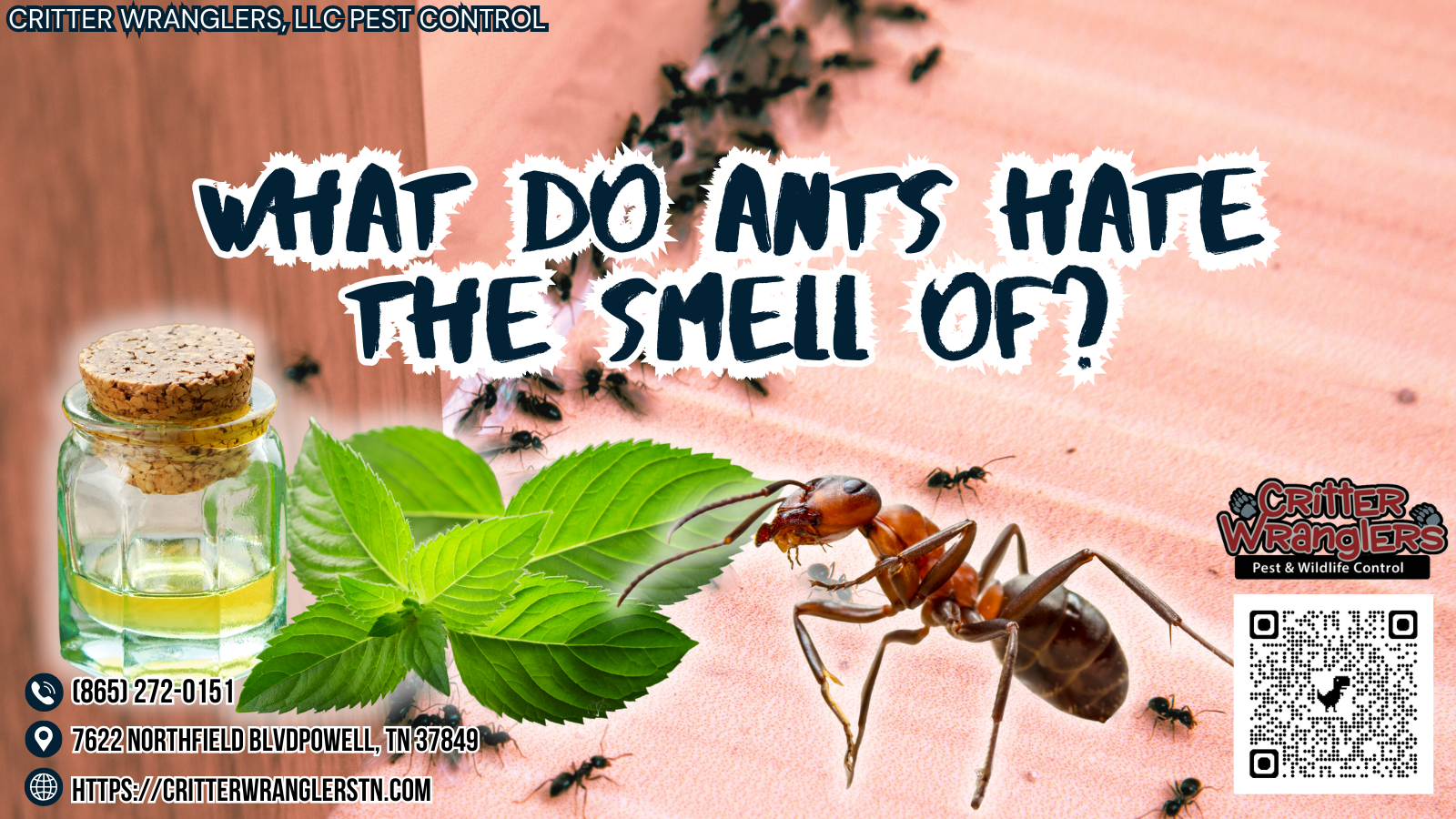Critter Wranglers, LLC Blog
Have an issue? Contact us today

What Do Ants Hate the Smell Of?
Ants hate the smell of citrus scents, vinegar, essential oils, cinnamon, peppermint, and garlic. Citrus peels and lemon juice repel them due to their strong odors. Vinegar disrupts their scent trails, while essential oils like peppermint and tea tree effectively deter invasions. Cinnamon and garlic also serve as natural repellents, utilizing their potent aromas to confuse ants. Other scents like coffee grounds and certain herbs can help keep ants at bay. Discover more effective options to manage ant problems.
Key Article Highlights
- Ants dislike the strong odors of citrus scents, such as lemon and orange peels, which deter their presence.
- Vinegar's pungent smell disrupts ants' scent trails, making it difficult for them to navigate.
- Essential oils like peppermint, tea tree, and lemon emit strong aromas that repel ants effectively.
- The powerful scent of cinnamon interferes with ant communication and can deter invasions.
- Garlic's potent odor confuses ants' navigation and communication, making it an effective natural repellent.
Citrus Scents: A Natural Ant Deterrent
Citrus scents often serve as a natural deterrent for ants. These pests are sensitive to strong odors, and the smell of citrus can disrupt their communication. Citrus peels, particularly from oranges and lemons, contain oils that are unappealing to ants. When placed in areas where ants are active, these peels can help reduce their presence. Additionally, lemon juice acts as another effective barrier. Spraying diluted lemon juice around entry points and nests can create a hostile environment for ants, discouraging them from entering homes. This method is not only eco-friendly but also easy to implement. By utilizing citrus peels and lemon juice, individuals can create a natural solution to keep ants at bay without harsh chemicals.
Vinegar: The Ants' Worst Nightmare
Vinegar stands out as one of the most effective natural remedies for repelling ants. Its strong smell disrupts the ants' scent trails, making it difficult for them to navigate and communicate. Homeowners often use vinegar solutions, mixing equal parts of vinegar and water in a spray bottle. This mixture can be applied to areas where ants are commonly seen. Additionally, vinegar serves as an excellent cleaning method, removing food residues that attract ants. By using vinegar to clean countertops and floors, individuals not only deter ants but also create a less inviting environment for them. Overall, vinegar's powerful aroma makes it a formidable barrier against these pesky insects, providing a safe and natural option for ant control.
Essential Oils: Powerful Repellents

While many people seek natural alternatives for pest control, essential oils have emerged as powerful repellents against ants. These oils, derived from plants, contain compounds that disrupt ant behavior and deter them from invading spaces. Common essential oil blends include peppermint, tea tree, and lemon, which are known for their strong scents that ants dislike. When applied, these natural repellents mask pheromone trails, making it difficult for ants to navigate. Users can mix essential oils with water or vinegar for effective application. Additionally, essential oils are safe for humans and pets, making them an appealing choice for those looking to avoid chemical pesticides. Ultimately, essential oils provide an eco-friendly solution for managing ant infestations.
Cinnamon: A Sweet Smell That Repels
Cinnamon has gained attention as another natural repellent against ants. Its strong aroma disrupts the ants' ability to communicate and navigate, making it an effective tool for pest control. People often use cinnamon in various forms, such as powder or essential oil, to create barriers that ants avoid. Beyond its pest-repelling qualities, cinnamon offers several health benefits. It has anti-inflammatory and antioxidant properties, supporting overall well-being. By incorporating cinnamon into pest management strategies, individuals can address ant problems while enjoying its health advantages. This dual-purpose use makes cinnamon an appealing choice for those seeking natural solutions in both pest control and personal health.
Peppermint: A Fragrant Barrier

Peppermint has emerged as a popular natural repellent against ants, thanks to its strong and invigorating scent. The aroma of peppermint oil is particularly effective in deterring these insects. Ants rely on scent trails to navigate, and the powerful smell of peppermint disrupts their communication and sense of direction. Homeowners often use peppermint plants around their gardens and entryways to create a fragrant barrier. These plants not only add beauty to the landscape but also serve as a natural defense against ant invasions. To enhance the effect, individuals can mix peppermint oil with water and spray it in areas where ants are present. This method provides a simple, eco-friendly solution for keeping ants at bay.
Garlic: The Strong Odor That Keeps Ants Away
Garlic has gained recognition as another effective natural repellent against ants, largely due to its potent odor. The strong smell of garlic disrupts the ants' scent trails, making it difficult for them to navigate and communicate. This is one of the primary garlic benefits, as it not only deters ants but also helps prevent future infestations. For garlic application, individuals can crush fresh garlic cloves and mix them with water. This mixture can then be sprayed around entry points and areas where ants are commonly seen. Additionally, placing whole cloves in strategic locations can further enhance its repelling effects. Overall, garlic serves as a simple and natural method to keep ants at bay, providing a safe alternative to chemical repellents.
Coffee Grounds: A Bitter Solution
Coffee grounds are often overlooked as a natural solution for repelling ants, yet their bitter scent can be surprisingly effective. The coffee benefits extend beyond a morning pick-me-up, as the strong aroma disrupts ant behavior. Ants rely heavily on their sense of smell to navigate and communicate. When exposed to coffee grounds, they may find the scent overwhelming and choose to avoid areas where it is present. Additionally, coffee grounds can mask pheromone trails that ants use to lead others to food sources. By scattering used coffee grounds around entry points or nests, individuals can create a barrier that deters these pests. Consequently, coffee grounds serve as a simple yet potent method for managing ant populations naturally.
Herbs and Spices: Nature's Ant Repellents
While many people may not realize it, a variety of herbs and spices can serve as effective natural repellents against ants. Common herbs like mint, basil, and rosemary release strong scents that deter ants from entering homes or gardens. Spices such as cinnamon and black pepper can also disrupt ant trails, making it harder for them to navigate. Creating herbal mixtures can enhance their effectiveness as repellents. For example, combining dried mint and crushed red pepper can create a potent barrier. These natural repellents are safe for both humans and pets, making them an appealing choice for households seeking eco-friendly solutions. Utilizing these herbs and spices provides an easy, sustainable way to keep ants at bay.
Soap and Water: An Effective Cleanser for Ants
A simple mixture of soap and water can be an effective solution for combating ants. This cleaning solution disrupts the ants' natural behavior by interfering with their ability to communicate and navigate. The soap properties break down the protective wax on the ants' bodies, leading to dehydration and eventual death. When sprayed directly on ants, this mixture acts as a barrier, preventing them from returning to their colony. Additionally, the scent of soap can mask trails laid by other ants, making it harder for them to find food sources. This method is not only easy to prepare but also safe for home use, providing a natural alternative to chemical insecticides. Consequently, soap and water serve as a practical and efficient ant deterrent.
Frequently Asked Questions
Can Ants Smell Food Through Strong Scents?
Ants possess strong scent perception abilities, allowing them to detect food even through strong scents. Their keen sense helps them locate nourishment amidst competing odors, showcasing their remarkable food detection skills in various environments.
Do Different Ant Species React to Scents Differently?
Many might assume all ant species react similarly to scents, but research shows that different species exhibit varying levels of scent sensitivity. This variation affects their behavior and response to various environmental odors.
How Long Do Scent Repellents Last Against Ants?
Scent longevity in ant repellents varies based on ingredients and environmental factors. Generally, repellent effectiveness diminishes over time, often requiring reapplication every few days or weeks to maintain ideal protection against ant incursions.
Are There Any Scents That Attract Ants Instead?
Ants are drawn to scents like honey and sugar, as if they were irresistible magnets. They respond strongly to ant pheromones, making scent preferences essential for attracting them. Understanding these preferences aids in effective pest management.
Can Household Cleaners Also Deter Ants Effectively?
Household cleaners can deter ants effectively due to their cleaner ingredients. The scent effectiveness of these products disrupts ant trails, making it difficult for them to navigate and locate food sources, thereby reducing their presence.
